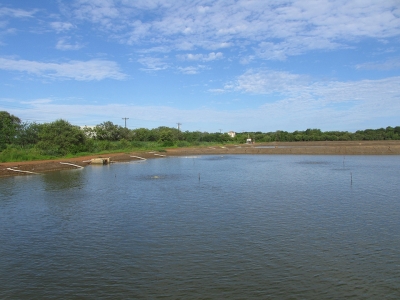Phytoplankton in aquaculture ponds: Friend or foe?
Phytoplankton can be a dilemma in aquaculture. Properly managed populations can be very beneficial (“friend”) to aquaculture production systems
 Phytoplankton and its impact on and water quality
Phytoplankton and its impact on and water quality The abundance of phytoplankton usually is high in aquaculture ponds because of high concentrations of nutrients from fertilizer or feed inputs.
 Decomposition and accumulation of organic matter in ponds
Decomposition and accumulation of organic matter in ponds Many producers believe that a large amount of organic matter in pond bottoms negatively impacts sediment condition and water quality during future crops.
 The importance of liming materials in aquaculture
The importance of liming materials in aquaculture Agricultural limestone, made by crushing limestone to a fine particle size, and lime made by burning limestone in a kiln are widely used in aquaculture.
 Lime plays crucial role in aquaculture pond management
Lime plays crucial role in aquaculture pond management Application of agricultural limestone to improve pH and alkalinity in aquaculture ponds is a widely used practice.
 Why Eating Farmed Fish is Better for the Environment
Why Eating Farmed Fish is Better for the Environment When it comes to choosing between farmed fish and wild fish, there are a lot of environmental concerns to be aware of: overfishing
 6 Easy Ways to Help Save the Environment
6 Easy Ways to Help Save the Environment The environment needs our help now more than ever. As governments from around the globe ramp up measures to ensure our planet is healthy for generations to come
 How Erosion and Forestry Impact Aquaculture
How Erosion and Forestry Impact Aquaculture Our world is constantly changing in many different ways—and not always for the better.
 What causes alkalinity changes in aquaculture waters?
What causes alkalinity changes in aquaculture waters? Total alkalinity is an important variable in water for aquaculture systems. The availability of inorganic carbon for photosynthesis tends to increase with great
 What happens to feed in aquaculture systems?
What happens to feed in aquaculture systems? Natural productivity in ponds without fertilization usually allows no more than 500 kg/ha per crop of fish or shrimp, but fertilization can increase productivit
 Do you know offshore aquaculture when you see it?
Do you know offshore aquaculture when you see it? For a nascent industry like offshore aquaculture – fish or shellfish farming outside of protected, near-shore conditions – clearly defining what it is
 Growth away from the coast: Examining inland shrimp farming
Growth away from the coast: Examining inland shrimp farming Inland culture of marine shrimp in areas away from the coast has been grown considerably in recent years. During the earlier years of the industry
 "Super Plants" Could Lead to Biofuel Breakthrough
"Super Plants" Could Lead to Biofuel Breakthrough Boeing and its partners in the project - Etihad Airways, Masdar Institute of Science and Technology and UAE jet fuel company Takreer - launched a new research
 SBRC Inaugurates World’s First Facility to Grow Both Food and Fuel in the Desert
SBRC Inaugurates World’s First Facility to Grow Both Food and Fuel in the Desert The world’s first research facility to grow both food and fuel, using desert lands irrigated by seawater,began operations today on a 2-hectare site in Abu Dhabi
 World’s first farm to grow food and fuel in the desert opens in Abu Dhabi
World’s first farm to grow food and fuel in the desert opens in Abu Dhabi The world’s first research facility to grow both food and fuel just opened in the United Arab Emirates. Located on a 2-hectare site in Abu Dhabi
 Biofuels from Saltwater Crops
Biofuels from Saltwater Crops Researchers at the Masdar Institute in the United Arab Emirates are starting a two-square-kilometer demonstration farm that will combine fish and shrimp farming
 Masdar trials desert fish farms and biofuels grown with seawater
Masdar trials desert fish farms and biofuels grown with seawater The world’s first research facility aimed at finding a way to grow food as well as biofuels using desert land irrigated with seawater has opened in Abu Dhabi.
 UAE to grow food and fuel in desert using seawater
UAE to grow food and fuel in desert using seawater Masdar’s project will produce bioenergy, boost aquaculture industry
 Soil pH Importance in Agriculture
Soil pH Importance in Agriculture In fact, one of the most important parameters to calculate before growing a specific plant in a specific soil is the PH value
 How decomposition of organic matter impacts aquaculture ponds
How decomposition of organic matter impacts aquaculture ponds In aquaculture, organic matter is applied to ponds directly in manures (animal dung, grass and agricultural waste) and feed
